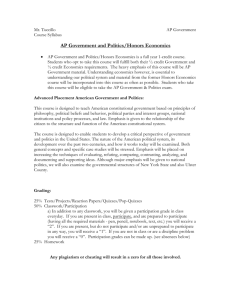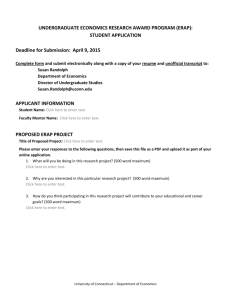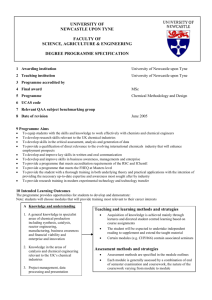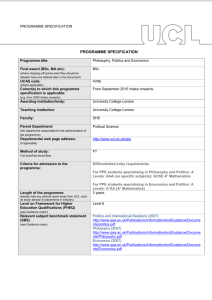BA (Hons) Politics and Economics
advertisement
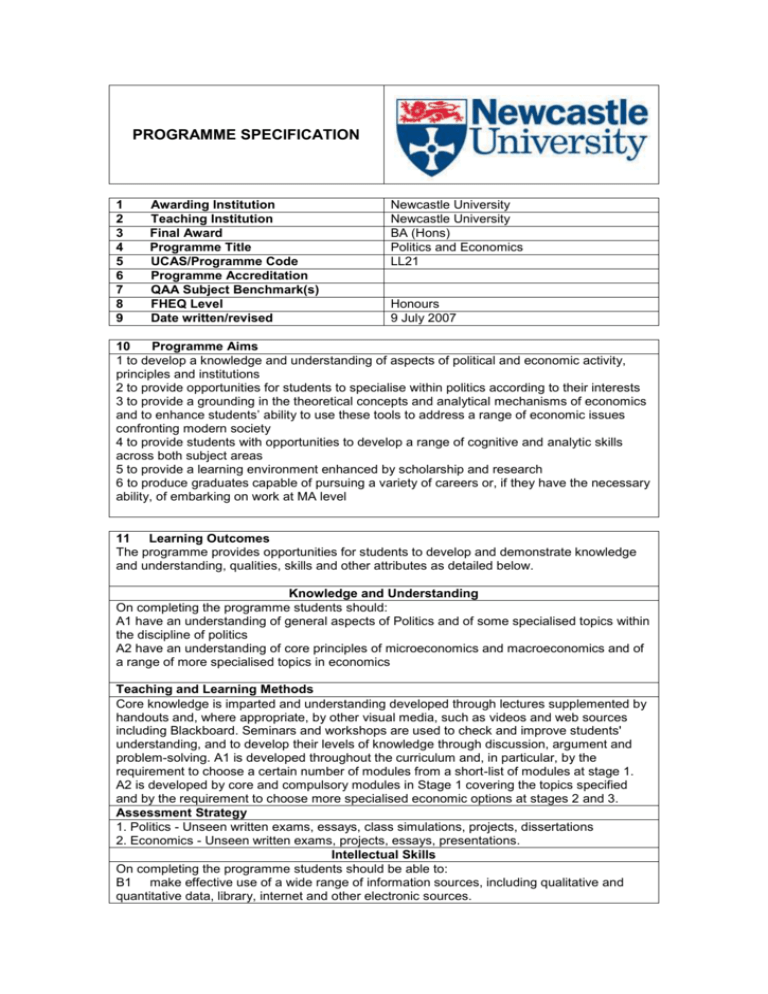
PROGRAMME SPECIFICATION 1 2 3 4 5 6 7 8 9 Awarding Institution Teaching Institution Final Award Programme Title UCAS/Programme Code Programme Accreditation QAA Subject Benchmark(s) FHEQ Level Date written/revised Newcastle University Newcastle University BA (Hons) Politics and Economics LL21 Honours 9 July 2007 10 Programme Aims 1 to develop a knowledge and understanding of aspects of political and economic activity, principles and institutions 2 to provide opportunities for students to specialise within politics according to their interests 3 to provide a grounding in the theoretical concepts and analytical mechanisms of economics and to enhance students’ ability to use these tools to address a range of economic issues confronting modern society 4 to provide students with opportunities to develop a range of cognitive and analytic skills across both subject areas 5 to provide a learning environment enhanced by scholarship and research 6 to produce graduates capable of pursuing a variety of careers or, if they have the necessary ability, of embarking on work at MA level 11 Learning Outcomes The programme provides opportunities for students to develop and demonstrate knowledge and understanding, qualities, skills and other attributes as detailed below. Knowledge and Understanding On completing the programme students should: A1 have an understanding of general aspects of Politics and of some specialised topics within the discipline of politics A2 have an understanding of core principles of microeconomics and macroeconomics and of a range of more specialised topics in economics Teaching and Learning Methods Core knowledge is imparted and understanding developed through lectures supplemented by handouts and, where appropriate, by other visual media, such as videos and web sources including Blackboard. Seminars and workshops are used to check and improve students' understanding, and to develop their levels of knowledge through discussion, argument and problem-solving. A1 is developed throughout the curriculum and, in particular, by the requirement to choose a certain number of modules from a short-list of modules at stage 1. A2 is developed by core and compulsory modules in Stage 1 covering the topics specified and by the requirement to choose more specialised economic options at stages 2 and 3. Assessment Strategy 1. Politics - Unseen written exams, essays, class simulations, projects, dissertations 2. Economics - Unseen written exams, projects, essays, presentations. Intellectual Skills On completing the programme students should be able to: B1 make effective use of a wide range of information sources, including qualitative and quantitative data, library, internet and other electronic sources. B2 to use the analytical apparatus of economics to address the range of issues confronting modern society. Teaching and Learning Methods The skills listed under B1 and their application to the study of politics are taught through lectures, seminars, exercises, and debates in skills modules at Stage 1 and Stage 2. Student presentations and essays require effective extraction of information at all three stages. The skills listed under B2 are developed throughout the economics curriculum. Lectures provide the principal means to impart intellectual skills. Analytical and critical thinking are enhanced and tested in seminars (mainly discussion classes), workshops (mainly numerical/technical problem solving), and private study (recommended reading and electronic sources). Assessment Strategy 1. Politics – essays and unseen exams, projects, dissertations, simulation exercises, literature reviews 2. Economics – these skills are assessed by a combination of unseen examinations, the principal method, and by assessed essays and project reports. Such assessed coursework tests skills that involve information and data gathering. Practical Skills On completing the programme students should be able to: C1 critically evaluate arguments and evidence C2 present a reasoned and informed position, verbally or in writing C3 engage in qualitative and quantitative analysis Teaching and Learning Methods Practical skills (C1 and C2) and their application to the study of politics are taught through lectures and seminars. Reasoned arguments (C2) are developed in seminars and through the use of simulation exercises at all three stages of the degree. Practical skills deriving from the study of Economics (C3) are developed throughout the economics curriculum. Lectures provide the building blocks for an analytical approach to practical problems. Seminars for discussion of problems and issues enhance and test the student’s practical approach, while workshops provide practice in mainly numerical/technical procedures; private study (recommended reading and electronic sources) consolidates and augments the taught elements. Assessment Strategy C1 and C2 are assessed through essays and exams, and through observed simulation exercises. C3 is tested by a combination of unseen examinations and coursework, with the former usually having the greater weight. Transferable/Key Skills On completing the programme students should be able to: D1 communicate well in both written and oral formats D2 plan and organise a programme of work or study D3 utilise basic IT skills D4 utilise an appropriate level of numerical skills Teaching and Learning Methods Written communication (D1) is developed through essays, projects and examinations while verbal communication (also D1) is developed through seminars, presentations, simulations and debates. Planning and organisation (D2) skills, are also developed through such sessions. IT skills (D3) are taught in Study Skills modules and further developed in core and compulsory modules in Economics, particularly mathematical and statistical modules (D4). Assessment Strategy D1 and D2 are assessed through essays, exams and simulation exercises. D3 is assessed as part of Study Skills modules at Stages 2 and 3 of Politics, and at Stages 2 and 3 of Economics. D4 is directly assessed through project and written exam in statistics but is also indirectly tested in coursework for other modules throughout the programme. 12 Programme Curriculum, Structure and Features Basic structure of the programme Duration: 3 years Stages: 3 Number of credits per stage: 120 (60 Politics and 60 Economics, with some flexibility at Stages 2 and 3). Number of credits per module: 10-40 Number of study hours per 10 credit module: 100 Students may take up to 20 credits in subjects other than Politics and Economics in Stages 2 and 3 of the degree. Requirements for progression: satisfactory completion of each stage in accordance with University Progress Regulations Key features of the programme (including what makes the programme distinctive) This joint-honours degree brings together two complementary areas of study. It aims to provide students with a range of conceptual and analytic, written and verbal, qualitative and quantitative skills that are highly transferable. Given these skills, students graduating from Newcastle University with a BA degree in Politics and Economics should be extremely attractive to prospective employers, but should also have the ability to go on to postgraduate study in either discipline. What therefore makes the degree distinctive broadness of its academic content and the flexibility or adaptability of the skills which it seeks to impart. Programme regulations (link to on-line version) http://www.ncl.ac.uk/regulations/ 13 Criteria for admission Entry qualifications GCSEs required: All candidates must satisfy the University's General Entrance Requirements and Matriculation Regulations at http://www.ncl.ac.uk/calendar/ A level subjects and grades: BBC from 18 units including two A levels, AVCE (Double Award) accepted if offered with an A level. Economics or Mathematics should ideally be offered at A or AS level. Alternative Entry qualifications for candidates offering Access courses: modules in Arts and Social Sciences desirable (where graded, at Credit level). Admissions policy/selection tools The admissions policy is based on a number of considerations: the applicant's predicted grades (if he or she has not yet sat her exams); the applicant's school reference; the applicant's personal testimonial; and, the applicant's earlier academic performance (e.g., his or her GCSEs) The decision as to whether to accept a candidate, and, if so, what offer to make, are based on all of these considerations. Non-standard Entry Requirements We recognise that students will apply to our degree programmes with a range of qualifications. We consider each application on an individual basis, taking into account the information on the UCAS form including past academic performance and potential. We welcome applications from students with non-standard qualifications other than the ones described above, and are pleased to advise anyone interested with regard to choosing an appropriate preparatory course of study. Additional Requirements None. Level of English Language capability 14 Support for Student Learning Induction During the first week of the first semester, students attend an induction programme specially designed for Politics and Economics students. New students are also given a general introduction to University life and the University’s principle support services and general information about the School and their programme, as described in the Degree Programme Handbook. New and continuing students will be given detailed programme information and the timetable of lectures/practicals/labs/ tutorials/etc. The International Office offers an additional induction programme for overseas students (see http://www.ncl.ac.uk/international/coming_to_newcastle/orientation.phtml) Study skills support Students will learn a range of Personal Transferable Skills, including Study Skills, as outlined in the Programme Specification. Some of this material, e.g. time management is covered in the appropriate Induction Programme. Students are explicitly tutored on their approach to both group and individual projects. Academic support The initial point of contact for a student is with a lecturer or module leader, or their tutor (see below) for more generic issues. Thereafter the Degree Programme Director or Head of School may be consulted. Issues relating to the programme may be raised at the StaffStudent Committee, and/or at the Board of Studies. Pastoral support All students are assigned a personal tutor whose responsibility is to monitor the academic performance and overall well-being of their tutees. Details of the personal tutor system can be found at http://www.ncl.ac.uk/undergraduate/support/tutor.phtml In addition the University offers a range of support services, including the Student Advice Centre, the Counselling and Wellbeing team, the Mature Student Support Officer, and a Childcare Support Officer, see http://www.ncl.ac.uk/undergraduate/support/welfare.phtml Support for students with disabilities The University’s Disability Support Service provides help and advice for disabled students at the University - and those thinking of coming to Newcastle. It provides individuals with: advice about the University's facilities, services and the accessibility of campus; details about the technical support available; guidance in study skills and advice on financial support arrangements; a resources room with equipment and software to assist students in their studies. For further details see http://www.ncl.ac.uk/disability-support/ Learning resources The University’s main learning resources are provided by the Robinson and Walton Libraries (for books, journals, online resources), and Information Systems and Services, which supports campus-wide computing facilities, see http://www.ncl.ac.uk/undergraduate/support/acfacilities.phtml All new students whose first language is not English are required to take an English Language test in the Language Centre. Where appropriate, in-sessional language training can be provided. The Language Centre houses a range of resources for learning other languages which may be particularly appropriate for those interested in an Erasmus exchange. See http://www.ncl.ac.uk/undergraduate/support/facilities/langcen.phtml 15 Methods for evaluating and improving the quality and standards of teaching and learning Module reviews All modules are subject to review by questionnaires which are considered by the relevant Board of Studies. Changes to, or the introduction of, new modules are considered at the School Teaching and Learning Committee and at the relevant Board of Studies. Student opinion is sought at the Staff-Student Committee or the Board of Studies. New modules and major changes to existing modules are subject to approval by the Faculty Teaching and Learning Committee. Programme reviews The relevant Board of Studies conducts an Annual Monitoring and Review of the degree programme and reports to Faculty Teaching and Learning Committee. External Examiner reports External Examiner reports are considered by the relevant Board of Studies. The Board responds to these reports through Faculty Teaching and Learning Committee. External Examiner reports are shared with institutional student representatives, through the StaffStudent Committee. Student evaluations All modules, and the degree programme, are subject to review by student questionnaires. Informal student evaluation is also obtained at the Staff-Student Committee, and the Board of Studies. The National Student Survey is sent out every year to final-year undergraduate students, and consists of a set of questions seeking the students’ views on the quality of the learning and teaching in their HEIs. Further information is at www.thestudentsurvey.com/ With reference to the outcomes of the NSS and institutional student satisfaction surveys actions are taken at all appropriate levels by the institution. Mechanisms for gaining student feedback Feedback is channelled via the relevant Staff-Student Committee and Board of Studies. Faculty and University Review Mechanisms The programme is subject to the University’s Internal Subject Review process, see http://www.ncl.ac.uk/aqss/qsh/internal_subject_review/index.php Accreditation reports None Additional mechanisms None 16 Regulation of assessment Pass mark The pass mark is 40 (Undergraduate programmes) Course requirements Progression is subject to the University’s Undergraduate Progress Regulations (http://www.ncl.ac.uk/calendar/university.regs/ugcont.pdf) and Undergraduate Examination Conventions (http://www.ncl.ac.uk/calendar/university.regs/ugexamconv.pdf). In summary, students must pass, or be deemed to have passed, 120 credits at each Stage. Limited compensation up to 40 credits and down to a mark of 35 is possible at each Stage and there are resit opportunities, with certain restrictions. Progression is subject to the University’s Masters Degree Progress Regulations, Taught and Research (http://www.ncl.ac.uk/calendar/university.regs/tpmdepr.pdf) and Examination Conventions for Taught Masters Degrees (http://www.ncl.ac.uk/calendar/university.regs/tpmdeprexamconv.pdf). Limited compensation up to 40 credits of the taught element and down to a mark of 40 is possible and there are reassessment opportunities, with certain restrictions. Weighting of stages The marks from Stages ??? will contribute to the final classification of the degree The weighting of marks contributing to the degree for Stages ??? is ?:? Common Marking Scheme The University employs a common marking scheme, which is specified in the Undergraduate Examination Conventions, namely <40 40-49 50-59 60-69 70+ Honours Fail Third Class Second Class, Second Division Second Class, First Division First Class Non-honours Failing Basic Good Very Good Excellent The University employs a common marking scheme, which is specified in the Taught Postgraduate Examination Conventions, namely: Summary description applicable to postgraduate Masters programmes Summary description applicable to postgraduate Certificate and Diploma programmes <50 50-59 60-69 70 or above <50 50 or above Fail Pass Pass with Merit Pass with Distinction Fail Pass Role of the External Examiner An External Examiner, a distinguished member of the subject community, is appointed by Faculty Teaching and Learning Committee, after recommendation from the Board of Studies. The External Examiner is expected to: See and approve examination papers Moderate examination and coursework marking Attend the Board of Examiners Report to the University on the standards of the programme In addition, information relating to the programme is provided in: The University Prospectus (see http://www.ncl.ac.uk/undergraduate/) The School Brochure (contact enquiries@ncl.ac.uk) The University Regulations (see http://www.ncl.ac.uk/calendar/university.regs/) The Degree Programme Handbook Please note. This specification provides a concise summary of the main features of the programme and of the learning outcomes that a typical student might reasonably be expected to achieve if she/he takes full advantage of the learning opportunities provided. The accuracy of the information contained is reviewed by the University and may be checked by the Quality Assurance Agency for Higher Education. Annex Mapping of Intended Learning Outcomes onto Curriculum/Modules Either Intended Learning Outcome A1 Module codes (Comp/Core in Bold) POL1016, POL1017, POL1022, POL1032, POL2012, POL2022, POL2033, POL2034, POL2045, POL2078, POL2079, POL3030, POL3046, POL3047, POL3048, POL3049, POL306, POL3071, POL3076, POL3077, POL3078, POL3079 ECO1001, ECO1010, ECO1004, ECO1015, ECO1013, ECO2001, ECO2002, ECO1008, ECO2006, ECO2008, ECO2010, ECO2011, ECO3003, ECO3013, ECO3016, ECO3018, ECO3021, ECO3022, ECO3023, ECO3025, ECO3026, ECO3027, ECO3028, ECO3031 A2 B1 B2 As in A1, but also including POL1031, POL2077 As in A2, but especially ECO1001, ECO1010, ECO2001, ECO2002, ECO1008, ECO3028 C1 C2 C3 As in A1 and A2 As in A1 and A2 POL1031, POL2077, ECO1001, ECO1010, ECO2001, ECO2002, ECO1008, ECO3028 D1 D2 D3 As in A1 and A2 POL1031, POL2077 POL1031, POL2077, ECO1008, ECO1010, ECO1015, ECO2001, ECO2002, ECO3026 ECO1001, ECO1008, ECO1010, ECO2001, ECO2002, ECO3018, ECO3027 D4 Or Module XYZ1001 Type Comp A 1 Intended Learning Outcomes B C 1, 2, 3 4 2, 3 D
